Dry, damaged hair and oily scalps can be challenging to manage, but rose water offers a natural remedy that can make a significant difference. “Is rose water good for hair growth?“
This blog explores how rose water can transform your hair care routine, providing benefits like moisturizing, reducing frizz, and promoting a healthy scalp.
Read on to discover why incorporating rose water might be the key to revitalizing your hair with Health Connect.
Is Rose Water Good for Hair Growth?
“Rose water is amazing for the hair,” says Lin Chen, co-founder of the sustainable beauty brand Pink Moon. “It’s hydrating and adds moisture to damaged, dry hair—especially beneficial for processed or colored hair.”
Rose water is a mild astringent that has anti-inflammatory properties. It can also help reduce oiliness, according to Dr. Marisa Garshick, a certified dermatologist at MDCS Dermatology. Therefore, those with oily scalps, dandruff, or seborrheic dermatitis can benefit from incorporating rose water into their haircare and scalp routine.
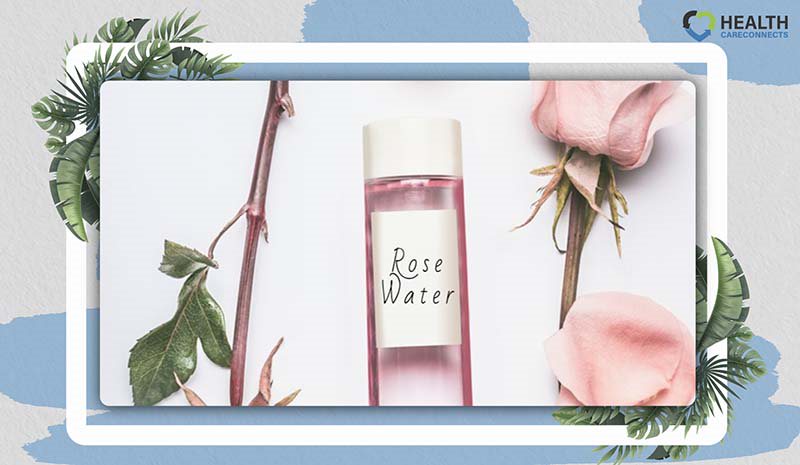
Advantages Of Rose Water For Natural Hair
Applying rose water for hair benefits is a great idea. As a mild astringent, rose water can prevent excess oil production on the scalp. An oily scalp can paradoxically lead to dandruff and other hair issues due to an imbalance.
Additionally, rose water contains vitamins A, B3, C, and E, known to prevent inflammation. According to Sperling, its anti-inflammatory properties can help manage conditions like eczema and psoriasis of the scalp. Beyond its medical benefits, many people use rose water for its pleasant, fresh-cut rose aroma.
Protects Against Dandruff
By reducing oil production, rose water helps prevent dandruff formation. Shari Sperling, DO, a board-certified dermatologist, recommends targeting scalp oiliness to stop dandruff. This is because dandruff results from oil overproduction.
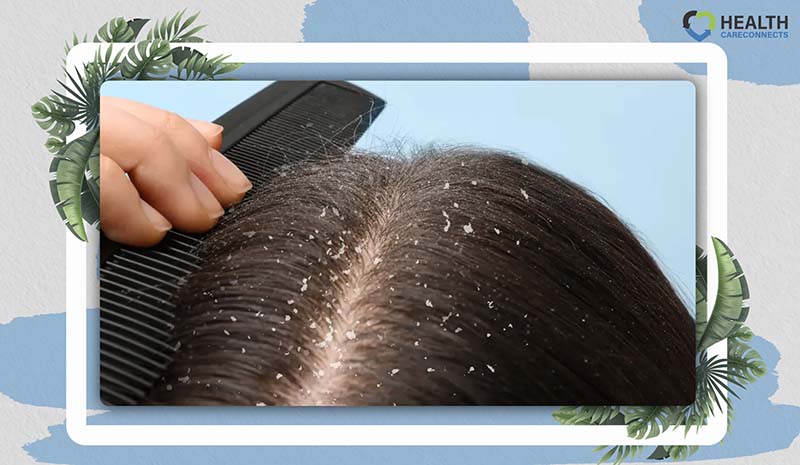
Contains Anti-inflammatory Properties
Rose water’s natural antioxidants and anti-inflammatory properties can soothe scalp irritation. Certified trichologist and hairstylist Gretchen Friese notes that it can especially benefit those with eczema or psoriasis of the scalp.
Prevents Hair Loss
A healthy scalp environment is crucial for preventing hair growth and loss issues. Friese explains that the anti-inflammatory properties of rose water promote a healthy scalp environment, reducing hair loss.
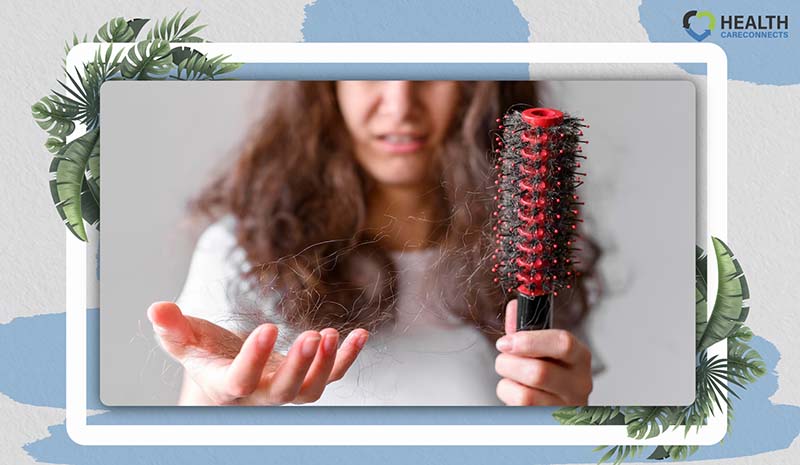
Acts As A Gentle Scalp Astringent
Rose water works as an astringent on the scalp, helping to constrict skin and prevent excess oil production.
Moisturizes To Address Frizz
Known for its rich hydrating and moisturizing qualities, rose water can combat dryness and soften hair texture. Its nourishing benefits improve overall hair and scalp health.
Reduces Stress
Stress is known as a significant contributor to hair loss. Rose oil, found in rose water, has been shown to ease nervous stress and tension. Studies credit it with alleviating allergies and headaches, further supporting its use in aromatherapy.
Potential Side Effects of Rose Water Usage
Rose water is generally safe for most people when used topically. As a natural product, it has limited side effects.
Nevertheless, some individuals may experience mild allergic reactions or sensitivities, just like with any cosmetic or natural product. It’s important to note that rose water can irritate the eyes or open wounds.
Overall, most people can use rose water for hair benefits without adverse effects. However, caution is essential, especially for those with a history of allergies or sensitivities.
To minimize the risk of side effects, follow these precautions:
- Use High-Quality Rose Water: Always choose rose water from a reputable source to ensure purity and quality.
- Perform a Patch Test: Before applying rose water to a larger skin area, do a patch test to check for any allergic reactions or sensitivities.
- Avoid Sensitive Areas: Do not use rose water near the eyes or on open wounds to prevent irritation.
Making Rose Water at Home
Here is how to use rose water for hair growth. Start with a half dozen fragrant roses. Many modern-day hybrid roses were cultivated for size or color instead of scent, so be sure to sniff before you buy. You’ll also need distilled water.
Steps to Make Rose Water:
Prepare the Roses:
- Gently pick the rose petals from their stems.
- Rinse the petals under warm running water in a colander to remove any dirt or pesticides.
Simmer the Petals:
- Put the rose petals in a large pot.
- Pour distilled water to cover the rose petals.
- Cover the pot with a lid.
- Simmer the rose petals on medium heat. It should be around 20 minutes or until the petals lose their color.
Strain and Store:
- Strain the rose petals out of the water and discard the petals.
- Store the rose water in one large or several small glass jars.
- Keep the jars in a cool place, away from direct sunlight.
Notes:
- Using distilled water helps ensure the purity of your rose water, free from contaminants.
- Storing rose water in glass jars rather than plastic helps maintain its quality and fragrance.
- Rose water can last up to a week when stored in the refrigerator, providing a refreshing and hydrating treat for your skin and hair.
Using Rose Water for Haircare
You can buy rose water ready-made or make it yourself. If you are buying rose water, look for one that doesn’t contain added preservatives, such as ethanol.
Ways to Use Rose Water for Hair for Hair Benefits
In Shampoo or Conditioner:
- Add rose water to your favorite shampoo or conditioner for an added boost of hydration and fragrance.
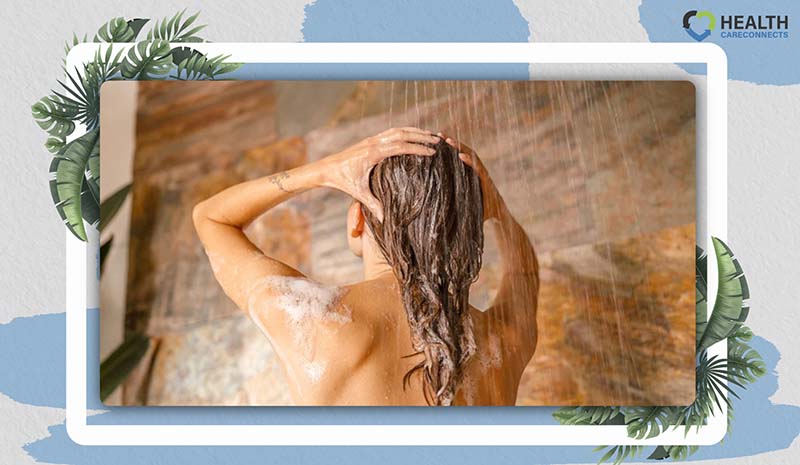
As a Hair Rinse:
- Pour rose water onto your hair after shampooing or after both shampooing and conditioning.
- You can leave it in your hair or rinse it out after several hours or overnight.
As a Hair Mist:
- Use a spray bottle to mist rose water onto your hair anytime you want to decrease frizz or add a fresh scent.
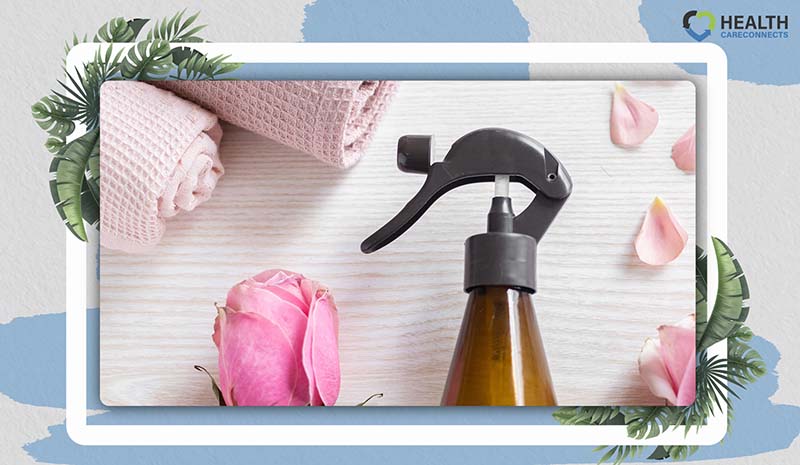
Direct Scalp Application:
- Use cotton swabs to apply rose water directly to the scalp.
- To reduce dandruff and itching, gently massage rose water in.
- Shampoo and rinse as usual afterward.
Frequency of Rose Water Application on Hair
Using rose water two to three times a week is recommended. Increased frequency of use may affect the scalp’s pH level.
Notes:
- Monitor your scalp and hair’s response to rose water to ensure it remains beneficial and does not cause dryness or irritation.
- If you experience any adverse effects, reduce the frequency of application or consult with a dermatologist for personalized advice.
FAQs
Is rose water good for all hair types? Yes, rose water is suitable for almost all hair types and textures, providing benefits ranging from moisturization to scalp health improvement. However, a hair expert can give you better personalized guidelines.
Can rose water help with controlling hair fall? Yes, it promotes a healthy scalp environment. Therefore, rose water may be beneficial for hair loss. However, it’s essential to speak with a healthcare provider for personalized advice on managing hair fall.
Can I use store-bought rose water for hair care? Yes, you can use store-bought rose water for hair care. However, opt for a pure, high-quality product without synthetic ingredients or added preservatives for the best results.
Conclusion
Is rose water good for hair growth? Yes, it is. Rose water offers numerous benefits for hair care, making it a versatile and natural addition to your beauty routine. From moisturizing and reducing frizz to promoting a healthy scalp environment, rose water is a valuable ingredient for almost all hair types.
We encourage you to share your own experiences with rose water in the comments. Explore more informative blogs from Health Connect to enhance your hair care knowledge.

Dr. Joyce Slater: Your Guide to Informed Health Choices
Dr. Joyce Slater shines as a distinguished expert in the field of nutrition and public health. Contributing her vast expertise to HealthConnectbc, she embodies a deep-seated passion for enhancing public well-being. As a respected figure in her field. Dr. Slater’s academic journey and professional achievements are nothing short of inspirational.
Holding a significant position as a researcher and educator, Dr. Slater has delved deeply into the intricacies of food literacy and nutritional science. Her work, prominently featured in numerous esteemed scientific publications, underscores her dedication to expanding our understanding of food’s role in health and society.
At the heart of Dr. Slater’s professional ethos is a profound desire to positively impact individual lives through education and research. She often says, “Empowering people with the knowledge to make healthier choices is the most rewarding aspect of my work.” This principle is the cornerstone of her involvement with HealthConnectbc, where she strives to provide reliable and practical health advice.
Dr. Slater’s contributions to HealthConnectbc are multifaceted: academically, she offers insights into the complex world of nutrition and health, enhancing both public understanding and professional practices. Additionally, she is instrumental in guiding and inspiring the next generation of health professionals, thus fostering future excellence in the field.
Juggling rigorous research with her educational duties, Dr. Slater demonstrates an unwavering commitment to her profession. Her approachable nature and genuine concern transcend the confines of academia, touching the lives of everyone she interacts with. Dr. Slater looks forward to continuing her journey of discovery and education, dedicated to the ongoing improvement of public health and nutrition.
At HealthConnectbc, Dr. J. Slater is not just a contributor; she is a guiding light, dedicated to enlightening and motivating individuals towards a healthier and more informed lifestyle.
PUBLISHED ARTICLES
- Food literacy competencies: A conceptual framework for youth transitioning to adulthood (2018)
- Self-perceived eating habits and food skills of Canadians (2016)
- Challenges to acquiring and utilizing food literacy: Perceptions of young Canadian adults (2016)
- Socio-demographic and geographic analysis of overweight and obesity in Canadian adults (2009)
- Sustainable well-being: Concepts, issues, and educational practices (2014)

